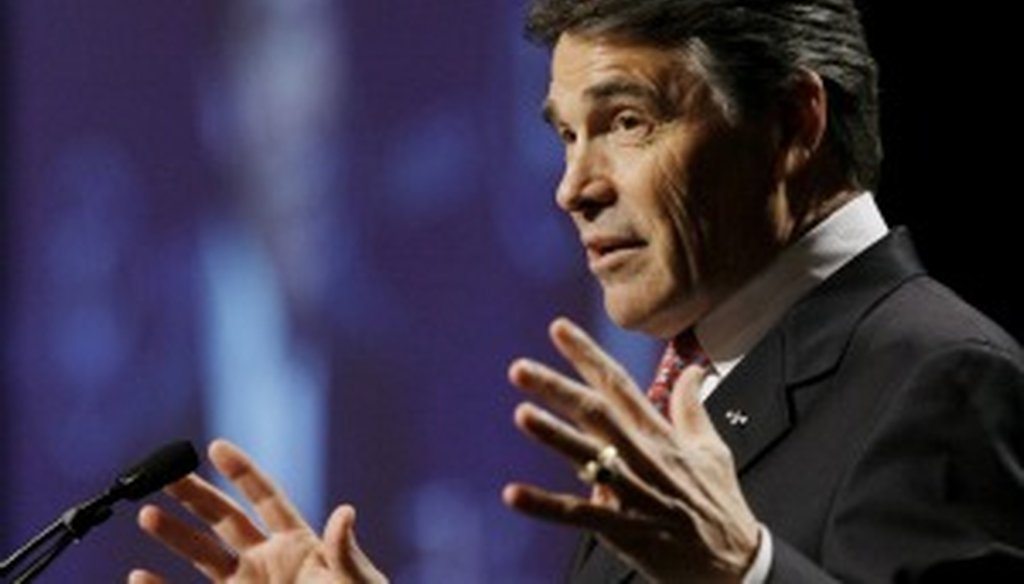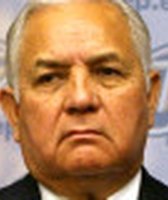Stand up for the facts!
Our only agenda is to publish the truth so you can be an informed participant in democracy.
We need your help.
I would like to contribute

PolitiFact Texas is tracking Gov. Rick Perry's campaign promises through the Perry-O-Meter.
Gov. Rick Perry homered on his promise to balance the state budget without a tax increase, but he struck out on vows to win a four-year freeze on college tuition and to send voters a proposed constitutional amendment raising the bar for future tax increases.
"Texas will continue to live within its means, and under my leadership, we will do it without a tax increase," Perry told the Lubbock Avalanche-Journal about a month before winning re-election in November.
Thanks to the Legislature’s help, this ended up as a Promise Kept on our PolitiFact Texas Perry-O-Meter. The Legislature failed to follow Perry’s lead on college tuition and the constitutional amendment on taxes, leading to Promises Broken ratings.
Tax promise: The 2012-13 budget approved by the Republican-controlled Legislature and signed into law by Perry spends $172 billion from state, federal and other sources, down 8 percent from 2010-11.
And it entails no tax increases, though for a moment we thought we had stumbled across a tax singling out residents of the Rio Grande Valley.
A June 28 Texas Medical Association summary of Senate Bill 7, a health care proposal approved in a June special session that awaits Perry's approval or disapproval, says the measure would generate more than $460 million for Medicaid by "placing a premium tax on Medicaid managed-care companies that are expanding to the Rio Grande Valley."
But Steve Levine, a medical association spokesman, and Anne Dunkelberg, associate director of the Center for Public Policy Priorities, each said it would be incorrect to characterize the targeted change as a tax hike.
According to Dunkelberg, the legislation requires certain valley residents who sign up for Medicaid to enroll in managed-care plans. Health care companies that offer the plans will have to pay the same existing tax that companies already pay in Bexar, Dallas, El Paso, Harris, Lubbock, Nueces, Tarrant and Travis counties. The tax is also charged of Texas HMOs in the commercial market.
Another tax wrinkle: Some state fees are poised to increase, but we spotted none charged to every — or even most — residents, an aspect that would make them more like a tax. For example, lobbyists would have to pay more to register with the Texas Ethics Commission, resulting in about $486,000 in additional agency revenue. All state prison inmates would have to pay an annual $100 health care services fee, projected to increase state revenue by $9.9 million. And surcharges on fees now levied by the Texas Railroad Commission would deliver additional money to a new Oil and Gas Regulation and Cleanup Fund.
College tuition promise: In February, Perry told lawmakers, "As families continue to struggle with the cost of higher education, I am renewing my call for a four-year tuition freeze, locking in tuition rates at or below the freshman level for four years."
No freeze made it into law.
However, Dominic Chavez, a spokesman for the Texas Higher Education Coordinating Board, alerted us to an adopted tweak that could, if universities opt in, allow graduates of two-year institutions to attend four-year colleges at an unchanged tuition rate for up to 24 months.
Tuition decisions have lately varied.
In late May, the Texas A&M University System Board of Regents voted not to increase general tuition this fall, though it signed off on additional charges for students in certain programs, according to a news article in the Bryan Eagle.
In June, the Texas Tech University System Board of Regents approved a 5.9 percent increase in tuition and fees, effective this fall, a decision defended by Texas Tech President Guy Bailey as partly offsetting a deficit tied to legislated budget cuts.
The same board increased tuition at Angelo State University by 9.9 percent as of this fall, according to an article in the San Angelo Standard-Times.
We rate this as a Promise Broken.
Constitutional amendment on taxes: In kicking off his latest re-election bid, Perry called for a constitutional amendment requiring two-thirds votes by the Texas House and Senate to pass a tax increase into law.
It currently takes majority votes in each chamber to advance tax changes.
Perry did not revisit his desire for the amendment in his February State of the State address to the Legislature.
House Republicans and a Senate counterpart offered proposals that did not pass.
In April, Sen. Dan Patrick, R-Houston, won committee approval of Senate Joint Resolution 12, setting a two-thirds hurdle for any new state tax or any increase in the rate of an existing tax. But the full Senate never took it up.
In the other chamber, Reps. Bill Callegari of Houston, Bryan Hughes of Mineola and Kelly Hancock of Fort Worth offered the same higher-hurdle mandates. The tax-writing House Committee on Ways and Means had a May 2 hearing on the measures, but none was sent to the full House.
In an interview, Hancock said Perry "started the conversation" about the two-thirds idea, and the governor was aware he had filed his proposal.
Still, it didn’t make it into law, and we rate this as a Promise Broken.
Our Sources
See related promises







































